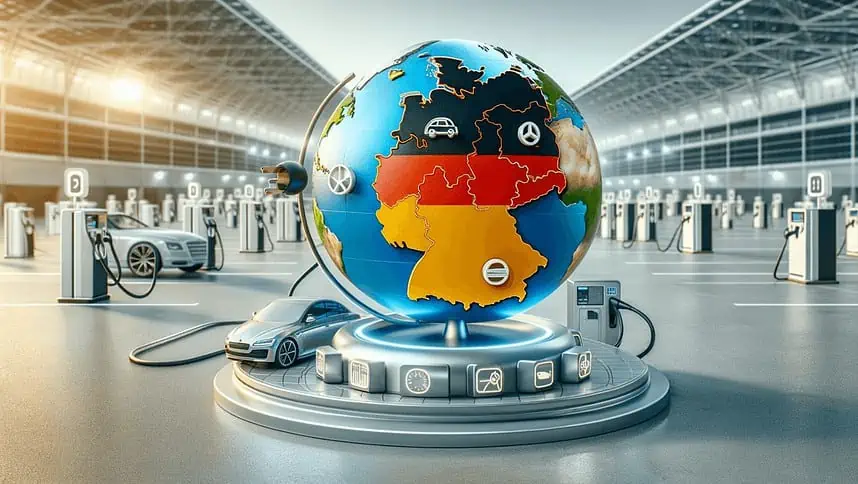Germany has been a leading proponent of electric vehicles, implementing a range of policies and initiatives to accelerate the adoption of electric vehicles in the country. The target goal by 2030 is to have up to 15 million EVs and 1 million charging stations according to the Climate Action Program 2030. Moreover, to attain this goal, in 2015, Germany’s Electromobility Act (EmoG) incentivized a shift towards sustainable, environmental, and climate-friendly transportation. This law created possibilities to prioritize and encourage the use of electrically powered vehicles in road traffic. Here are the key aspects of Germany’s EV policy:
Demand incentives
The German government offers financial incentives to encourage the purchase of electric vehicles. This includes subsidies for both all-electric and plug-in hybrid vehicles. More information on Regulatory environment and incentives:
- A purchase grant called the environmental bonus for new EVs provides €4,000 for non-hybrid electric cars and €3,000 for plug-in hybrids. This grant applies to cars with a list price of up to €60,000 and applies to the purchase and lease of company and commercial vehicles. To participate in the program, application is through the Federal Office for Economic Affairs and Export Control (BAFA) which started on July 2, 2016. Note: From 1 January 2024, there will be a reduction in funding to around €3,000.
- As of 1 January 2023, funding is only available for new and used BEVs and FCEVs
- bonus for new cars with a net list price ≤ €40,000 will receive €6,750
- Bonus for new cars with a net list price > €40,000 and ≤ €65,000 will receive €4,500
- From 1 September 2023, only private individuals will be able to apply for funding.
- As of 1 January 2023, funding is only available for new and used BEVs and FCEVs
- The Federal Ministry for Digital and Transport (BMDV) supported the purchase of EVs for the local authorities and publicly owned institutions in the electrification of their vehicle fleets. The government provided financial assistance to cover 40% of the additional costs associated with purchasing an EV which also extends to its charging installation. For vehicles used in public services, the fund covered up to 90% of the additional investment costs. Note: The deadline for the application ended on 8 June 2023. More information can be found here.
- Federal funding KsNI provides funds for the purchase of commercial vehicles, specialized vehicles, and converted diesel vehicles powered by batteries, fuel cells, plug-in hybrid systems, or hybrid overhead line drives. To learn the details including the application and approval process, download Funding Guidelines 2022 or visit this page. Note: Deadline was August 24, 2022.
- EV owners can benefit from tax exemptions and reduced tax rates until 31 December 2030. Below are the indicated tax benefits for EV users, and to learn more about this, you may visit the VDA EV Tax webpage:
- For BEVs and FCEVs registered until 31 December 2025, EV owners can benefit from a 10-year tax exemption depending on the date of initial registration. If interested, you may use the German EV Tax Calculator.
- Owners of newly registered low-emission passenger cars with spark- or compression-ignition engines and carbon dioxide emissions of up to 95 g/km are exempt from paying the annual tax of €30 for five years, starting from the date of first registration. This exemption applies to vehicles registered for the first time between June 12, 2020, and December 31, 2024.
- For new and used company cars, the taxable amount for BEVs and PHEVs can be reduced from 0.5% to 1% of the gross catalog price per month. BEVs with a gross list price up to €60,000 can receive an additional reduction in taxable amount, from 0.25% to 1% of the gross catalog price per month. While PHEVs must emit a maximum of 50 g/km of CO₂ or have an electric range of at least 40 km to be qualified. This electric range requirement is effective until December 31, 2021, after which it will be increased to 60 km, and further to 80 km starting January 1, 2025.
- The financial benefit of receiving free or discounted electricity for charging vehicles at the workplace and from using company-owned charging devices will be exempted from income tax until the end of 2030. This exemption is extended until the end of 2030.
- Employers can benefit from tax-free reimbursement for the employee electricity costs that occurred upon charging their electric vehicles at both public charging stations and private households.
Charging infrastructure
- The German federal government in 2019 adopted a charging infrastructure master plan to expand the electric vehicle charging stations to build 1 million public charging points by 2030. In 2022, the federal government has developed a new cross-departmental overall strategy aimed at constructing user-friendly, fast, and convenient charging points for electromobility under the Master plan for charging infrastructure II.
- To support this goal, municipalities will receive assistance from the Federal Network Agency for planning, implementing, and financing charging infrastructure to make electromobility a reality in their communities. This new plan also includes “Easy e-truck charging” on company premises and at transfer points. The highlight of the Master Plan for Charging Infrastructure II focuses on ease of use, encourages investments, ensures supply and assistance, and charging point expansion. If you want to learn more, visit the National Control Center webpage and get the guidelines documents necessary or download the published plan in German or English.
- Federal funding KsNI funded refueling and charging infrastructure up to 80% of the total project-related expenditure. To get all the information in detail including the application and approval process, download Funding Guidelines 2022 or visit this page. Note: The deadline ended on August 24, 2022.
- The Federal Ministry for Digital and Transport (BMDV – Bundesministerium für Digitales und Verkehr) of Germany launched two new funding programs:
- The self-generation for charging in residential buildings for EVs and the use of solar power began on 26 September 2023. Homeowners can receive a lump sum of KfW subsidy of up to €10,200 for the installation of a charging station, photovoltaic system, and battery storage, as long as they own or have a binding order for an electric vehicle. This action lessens the demand for public charging. This application will be handled by KfW using their online customer portal. If you want to know the funding details, visit BMDV or KFW webpage or download the funding guidelines (in German). Note: This fund is no longer available
- The purchase and installation of fast-charging infrastructure for SMEs and large companies is funded to support e-cars and e-trucks in the commercial sector that are not accessible to the public and have a nominal charging capacity of ≥50 kW. This program grants up to 5 million euros per company that targets fleet vehicles of craft and commercial enterprises, transport and logistics companies, parcel delivery services, taxi companies, rental cars, and car sharing. To obtain documents and instructions for the application, please refer to the Project Management Jülich website. Note: The application is expected to be possible on Nov. 30, 2023.
- To know about other funding programs in the past under the National Center for Charging Infrastructure, click here.
Battery development
- High-Tech Strategy 2025 aims to establish Germany as a leading supplier and leading market for electromobility. It focuses on fostering collaboration among research institutions, expanding battery research and battery cell production, developing intelligent charging stations, and translating research findings into practical applications.
- In 2021, the European Commission approved the European Battery Innovation (EuBatIn) project which provided fund support to the 11 companies operating in Germany such as ACI Systems, Alumina Systems, BMW, Cellforce Group, ElringKlinger, Liofit, Manz, Northvolt, SGL Carbon, Skeleton Technologies, and Tesla. To learn more, you may read the EuBatIn Press Release.
- Germany joined an initiative by the European governments called the European Battery Alliance (EBA) aimed to develop a sustainable and competitive battery value chain in Europe in 2017.
Other Policy
- Parking and Road Access Privileges under the Electromobility Act (EmoG) empower cities and municipalities to grant electrically powered vehicles special privileges in public spaces, such as EVs in bus lanes, issuance of E license plates, removal of certain access restrictions and reduced or waived parking fee. To know more, click here.
- Innovation Bonus: The government supports research and development in the electric vehicle sector, providing grants and funding for innovative technologies related to EVs, batteries, and charging infrastructure such as:
- LaneCharge is a research project funded with a total of 2.77 million euros as part of the Electric Mobility Funding Guideline of BMDV to explore methods for EV charging via induction. To learn more about the LaneCharge project, you may visit the NOW GmbH page, and then for LaneCharge to electrify a taxi rank, click here.
- Fleet Electrification: The Federal Government and some local governments have committed to having at least 20% of their vehicle fleets composed of electric vehicles.
- Munich has launched an investment program, which includes the purchase of EVs for both the city fleet and public transportation. BMDV provided funds for the Munich airport fleet in targeting an emission-free goal by 2030.
- Berlin government initiated the “Business-oriented Electromobility” (WELMO) funding program to encourage small and medium-sized businesses to switch to electric commercial vehicles. The program aims to promote the electrification of commercial vehicle fleets in the city. To apply online, visit the WELMO page.
- Germany promotes the electrification of public transportation, spearheading initiatives to expand electric bus fleets and develop hydrogen-powered trains funded by the National Hydrogen Strategy. The Alstom Coradia iLint as the world’s 1st hydrogen-powered passenger train is followed by hydrogen train trials by Siemens Mobility and Deutsche Bahn.
Germany is firmly committed to electromobility with efforts made for the implementation of policies and programs aiming to adopt electric vehicles and increase the transition to a more sustainable transportation system.Note: You may also use Funding Finder to look for available funding programs for electric vehicles and charging infrastructure.






